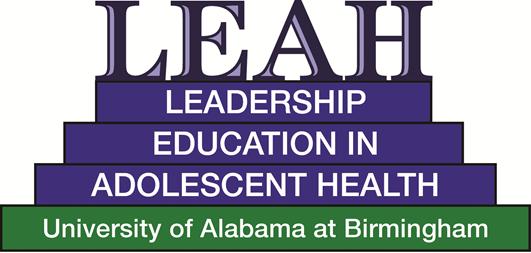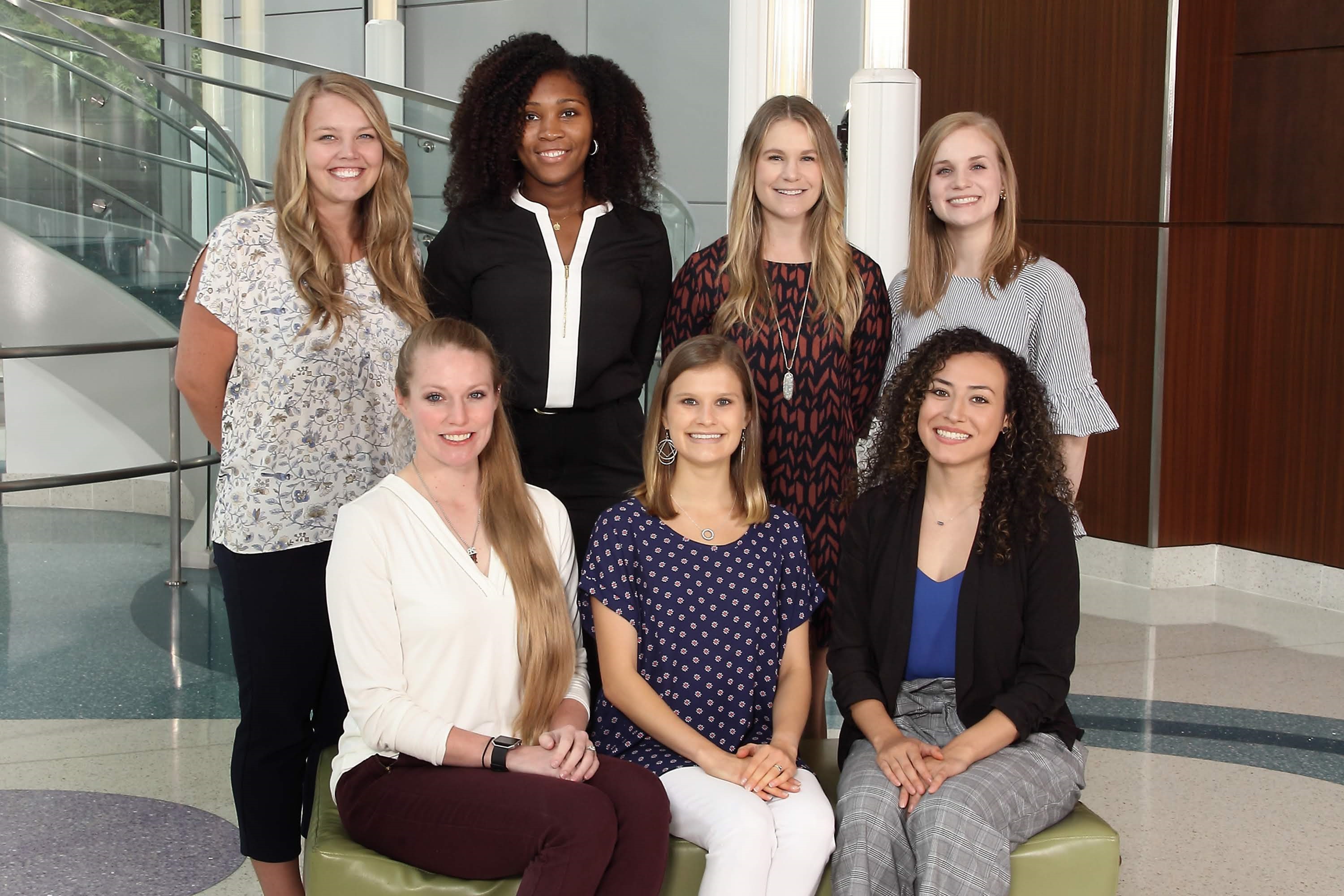
The UAB LEAH Program is housed in the Division of Adolescent Medicine. UAB LEAH is committed to improving the health status of adolescents, particularly those in the southeastern region of the U.S through its interdisciplinary leadership education of adolescent health professionals in a model center of excellence in training, research and service that is adolescent-centered/family-involved, culturally competent and community-based. Back row (L to R) Hailee Benson- social work, Kendra Spain- nursing, Kathryn Thompson- psychology Pre-Doc, Emily Linde- nutrition, Sydney Watkins- nutrition, Kristin Gunderson- nutrition, Jessica Garcia- nutrition
Back row (L to R) Hailee Benson- social work, Kendra Spain- nursing, Kathryn Thompson- psychology Pre-Doc, Emily Linde- nutrition, Sydney Watkins- nutrition, Kristin Gunderson- nutrition, Jessica Garcia- nutrition
UAB LEAH program offers:
-
Academic & Research Programs
Academic Training Programs
The UAB LEAH has designed a comprehensive core of clinical, didactic, research and experiential curricula for short-term, intermediate, and long trainees/fellows in the following disciplines: medicine, nursing, nutrition, psychology, and social work. UAB provides a supportive environment which values and utilizes the skills and expertise of each team member as well as provides for mutual respect to arrive at outcome-driven joint decisions (ex: joint policy papers, LEAH classes/case conferences, MCH Leadership Network seminars, joint presentations, Children’s Policy Councils). The curriculum also provides for shared leadership, incorporating accountability and responsibility for outcomes (ex. shared case coordination, LEAH clinics, developing training for adolescent coordinators/school nurses and adolescent health continuing education events).
Scientific and Research Capabilities
UAB has a very active and productive research environment. The University ranks 27th among academic institutions in federal research funding and 20th in the NIH funding. LEAH faculty are actively engaged in research in issues such as adolescent overweight and obesity, high risk sexual behaviors, delinquency, complementary medicine, child and family adjustment, and HIV/AIDS and CMV clinical trials. Faculty are funded by NIH, Robert Wood Johnson Foundation, Alabama Department of Public Health, and industry.
UAB LEAH faculty are also involved in policy research and development on issues such as adolescent preventive health care, nutrition and physical activity and sexual health. UAB Faculty provide topical expertise for Bright Futures Guidelines for Health Supervision, the Alabama Obesity Task Force, Alabama STD Advisory Council, Alabama Campaign to Prevent Teen Pregnancy, and local Children’s Policy Councils.
-
Clinical Programs
The LEAH Clinic is an interdisciplinary clinic in Adolescent Health at Children's of Alabama that specializes in the evaluation and treatment of adolescents and young adults ages 11-21 with complex medical-psychosocial needs. The clinic is staffed by LEAH trainees and UAB faculty.
The Adolescent Health Center at Children’s of Alabama is named after the late Dr. William A. Daniel Jr, (1914-1998). Dr. Daniel was the founder of the UAB Division of Adolescent Medicine and one of the originators of the subspecialty of adolescent medicine. At the center more than 1200 teenagers and young adults are seen each year by a team of health professionals (physicians, nurses, nutritionists, and psychologists and social workers) specially trained to handle their unique problems.
The Family Clinic, located at Children’s of Alabama, is dedicated to addressing the needs of HIV/AIDS-infected children and their families through coordinated medical and psycho-social care. The Family Clinic strives to provide comprehensive, coordinated, and multidisciplinary care through access to primary health care with population-specific providers, pediatric clinical trials and research, and family and community education.
The Eating Disorder Clinic specializes in the medical and nutritional care of adolescents and young adults with disordered eating, including anorexia and bulimia nervosa. Patients are evaluated by an Adolescent trained physician and dietician. They work closely with each patient’s psychotherapist to provide a comprehensive team approach for treatment. The clinic also provides diagnostic consultation for patients with unexplained weight loss, vomiting, or abdominal pain.
The Adolescent Nutrition Clinic specializes in nutrition counseling for adolescents. Registered Dietitians provide nutrition assessments and counseling to teens and families. Adolescents are seen for a variety of nutritional concerns including the following: Sports nutrition; Weight management (weight loss or weight gain); Healthy eating; Anemia; and Elevated blood lipid levels (cholesterol, triglycerides).
Juvenile Correctional Care services are provided by UAB LEAH faculty at facilities in Jefferson and Tuscaloosa counties. Our faculty provide medical services, mental health screenings and counseling, nutrition consultation, reproductive health education counseling and STI testing.
The Children’s Center for Weight Management is a comprehensive center designed to address the needs of one of Alabama’s most common health issues for children and adolescents – childhood obesity. Although many children and adolescents who are overweight are not physical ill, being overweight puts them at risk for more serious long term health issues, such as diabetes and high blood pressure, as well as psychosocial difficulties (e.g. peer teasing, depression). The Children’s Center for Weight Management can assist youth who are overweight and their families in establishing healthy habits to achieve their overall goals through a variety of services.
The Adolescent Reproductive Endocrinology Clinic is currently being established. This clinic will address issues such as the management of polycystic ovarian syndrome, irregular menstrual periods, and dysmenorrhea.
-
Community Programs
Partnership with Birmingham Mayor’s Office Division of Youth Services
LEAH faculty partner with the Birmingham Mayor’s Office in its initiative to address the health and wellness of area youth. Faculty provide assistance and guidance with events such as health fairs, health forums, and media outreach.
Camp SHINE
Camp SHINE is an overnight camp for current and new patients of Children’s Center for Weight Management. Campers age 12-15 learn healthy eating habits while preparing meals. They also have opportunities to participate in swimming, canoeing, hiking, arts and crafts, dance and many more activities. At Camp Shine, participants enjoy a week of fun while learning how to become healthy. Our goal is to address the nutritional, activity and emotional needs of overweight kids in a fun and supportive environment.
HEAL
Healthy Eating Active Living (HEAL)© is a program that is designed to promote healthy eating behaviors and physical activity through a school based curriculum housed in the physical education in grades 3-6. The goals of the program are to improve the physical fitness and nutritional intakes and increase the nutrition and exercise knowledge in students through the use of the HEAL© curriculum over a one-year academic school term. HEAL© offers a cutting edge curriculum which is both educational and performance based. The curriculum exceeds all the state standards for Physical Education and at the same times requires students to move continuously in their cardiovascular target heart rate zone (65%-80% of maximum). With the heart rate monitors, teachers are able to accurately determine if each child is in their cardiovascular exercise zone. The heart rate monitors offer an even playing field for each child no matter the level of physical condition, including children with special health care needs. The monitors also allow the teachers to quantify each child’s cardiovascular improvement. Results have shown that students in HEAL schools have significantly improved fitness, improved knowledge scores and decreases in BMI over control schools not involved with HEAL.
-
Distance Learning
Partnership with University of Alabama
UAB LEAH is engaged in distance learning with the University of Alabama through the Rural Health Institute for Clinical and Translational Science. This project provides technical assistance, education, and clinical consultation to rural practitioners in Alabama.
Partnership with UAB School of Public Health
Partnering with the Alabama Public Health Training Center, UAB LEAH develops programs that strengthen the technical, scientific, managerial, and leadership competence of the current public health workforce in Alabama and Mississippi. Training and education programs developed by the AL PHTC and LEAH are competency-based, grounded in core public health functions and Essential Public Health Services, and designed to improve the capacity of the public health workforce, including those in community-based organizations providing public health services in underserved areas. Training and education programs are tailored for specific target audiences and delivered through distance education technologies and on-site programs.
LEAH Faculty
Tamera Coyne-Beasley, M.D.
Director, Division of Adolescent Medicine
Amy Traylor, PhD
atraylor@peds.uab.edu
Stephenie Wallace, MD, MPH
Director, Children's Center for Weight Management
Heather Austin, PhD
haustin@peds.uab.edu
Glenda Smith, PhD, DSN, CRNP
glsmith@uab.edu
Through its collaborative relationships with other area MCHB-funded projects such as those of the Alabama MCH Leadership Network, the Alabama State University (ASU) Pipeline Training Program, and MCH Title V partners, the UAB LEAH Project will meet the needs of the underserved populations of the South by training emerging leaders in adolescent health in the core disciplines of medicine, psychology, nursing, nutrition, and social work.
Application now open for Leadership Education in Pediatric Nutrition Program
Training Program Contact Information:
University of Alabama at Birmingham
Division of General Pediatrics and Adolescent Medicine
1600 7th Ave South
Birmingham, AL 35233
Phone: 205-638-9345
Email: uableah@uab.edu